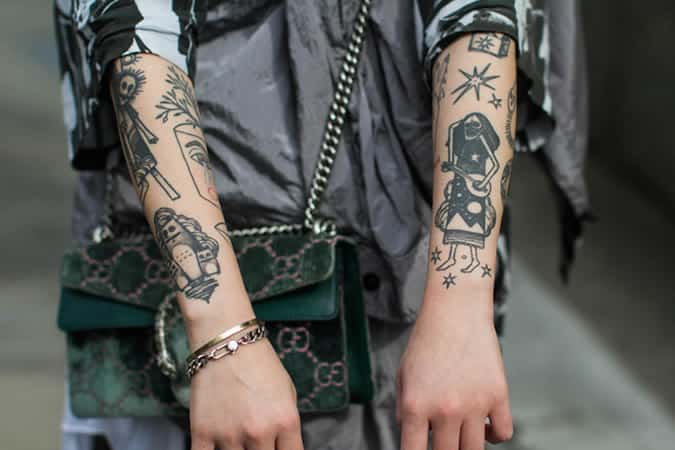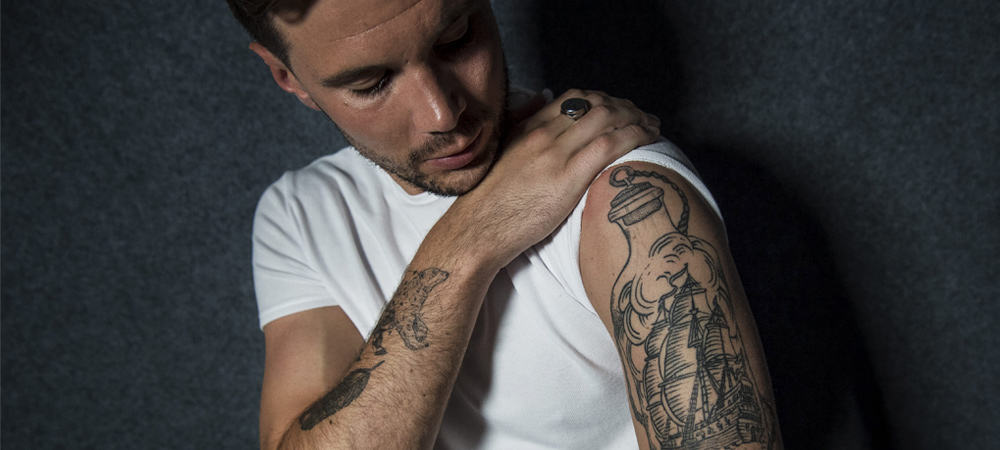Not so long ago, arm tattoos were the stuff of cartoonish stereotypes – a faded anchor upon a beefy bicep, tribal patterns worn in suburbia, a sash wrapped around a heart proudly declaring “Mum”. No more. Tattoos reveal your style and personality. “They’re a great way of showing your soul on your skin,” says Bristol-based tattoo artist Matthew James.
The arms are still the go-to place for most men to get their tattoos – especially for first timers. It’s a place that’s easy to both cover up and show off with, let’s be honest, a bit of macho relish. Before you get the latest tattoos on your arms, consider the artist, the style, the colour and the location.
For ideas and advice on choosing arm tattoos, we spoke to top tattoo artists.

What To Look For When Choosing A Design
It’s the ultimate tattoo question: what design will I be happy to live with for the rest of my life? “I think the best advice for choosing a tattoo is to think for yourself,” says James. “It’s simple – avoid trends and don’t be ashamed to like what you like. There are no rules.” Arguably just as important is choosing the artist, who will ultimately end up realising the design and could influence your choices.
“A good artist will work with you to create the design you want to fit and flow with the contours of your body,” says James. “Some good advice is to always ask an artist to show you pictures of their healed work. A good artist will be more proud of their healed work than their fresh work and will work with you until your tattoo has healed perfectly.”
How to Put it on Your Arm
The choice of a design, artist and placement is important. It’s best to have some respect for the artistry and pain of tattooing – artists often recount tales of bolshie, testosterone-ravaged blokes who jump in with full sleeves and are quickly reduced to a blubbing mess. Ricky Williams of South City Market in London, a minimalist black and white tattoo studio, suggests that you think about your arms as prime property.
“If it’s your first one and you’re planning on getting more, it’s best to not get something little right in the middle of a large area,” he says. “A tiny tattoo in the centre of your bicep will make it harder to get a bigger tattoo there in later life.” Got off-centre, higher towards your shoulder or somewhere on the forearm.

What body types suit which arm tattoos?
Don’t be put off getting an arm tattoo just because you don’t spend your evenings smashing bicep exercises like Arnie circa 1974. When it comes to which styles look good on which types of arms – muscular, slim, skinny, or meaty – there are no hard and fast rules.
“There’s no way of telling whether that person’s arm will stay the same anyway, people gain and lose muscle and fat all the time,” says Williams. “Weirdly enough, sleeves actually look amazing on any body type if they’re done correctly. There are so many different avenues and styles you can go with and ultimately if someone is committed enough to get a sleeve they normally know themselves and choose a style that looks perfect on them.”

Black vs. Colour
Tattoos are a hot topic of discussion. Does black and gray or colour tattoos appear better? Black and grey tattoos are more popular for modern and neo-traditional styles. While colour is associated with more traditional tattoos.
“Colour tattoos can look amazing on some people and a lot of us have them,” says Williams. “But colour tattoos only really work well on quite pale skin. For darker skin, black ink works best. Traditional-style tattoos look great in colour – ornamental looks better in black.”
“It’s all down to personal preference regarding colour or black,” says Matthew James. “If you look after your tattoo – keep it out of the sun! – it will always keep its vibrancy and beauty as long as it’s tattooed well.”
Arm Tattoos
Fine Line
 Shaun Sepr
Shaun Sepr
Fine line tattoos are one of the most popular modern styles for skin art. They use thinner needles in order to achieve softer illustrations and details.
“Fine line seems to appeal to people who haven’t got a lot of tattoos,” says Shaun Sepr, a tattoo artist at Holey Skin Bath Road, Bristol. “It’s not very aggressive and it’s a nice way to start. The style is mainly of nature – plants, flowers, herbal illustrations. People seem to like using old book illustrations for their designs. You can find lots of stuff online but people tend to dig deeper.”
Micro Realism
 Ricky Williams
Ricky Williams
This is as it sounds: miniature but ultra realistic illustrations, often of people, animals, or landscapes – a style that Ricky Williams specialises in.
“Micro realism is pretty new and it’s amazing to see what can be created on someone’s skin,” says Williams. “There’s so much more variety now. The new styles are also popular because they appeal a wider range of clients. It isn’t just sailors and convicts getting tattooed now and so there’s a whole generation of new tattooers creating beautiful delicate designs for regular people who appreciate tattoos.”
Ignorant
 Ego Sum Lux Mundi
Ego Sum Lux Mundi
To call ignorant tattoos a “style” might be misleading; it’s more about an attitude and approach. They often feature cartoon-like images of graffiti-inspired designs, mainly line work, and are without colour. An example is the above tattoo by Madrid-based Ego Sum Lum Mundi.
“Ignorant tattooing is a relatively new trend even though it’s massive now,” says Williams. “I’m not being rude either – it’s actually just called ‘Ignorant’. It developed from DIY tattoos and it’s a sort of rejection of all the tattoo ‘rules’. They’re often quite funny or tongue in cheek. There are tons of ignorant tattoo artists in reputable studios so there’s no need to get an actual DIY tattoo…”
Black and Grey Realism
 Matthew James
Matthew James
This style, the big brother to micro-realism, is based on ultra-realistic portraits and often has a gothic aesthetic. It looks great on sleeves and large body parts due to the scale and level of detail. Matthew James is one of the UK’s top artists working in the style.
“I like to work with the ebbs and flows of a body,” he says. “I make sure to place designs well on the flattest areas of the body so they don’t warp, using composition to push your eye around a piece and give it some movement. It seems that the only rule broken is making sure designs are clear enough to age well. Age definitely takes its toll on ink under the skin, so it’s good to have a good bit of negative space running though your deigns to give them some longevity.”
Neo Traditional
 Blake Byrne
Blake Byrne
Neo-traditional tattoos use strong colors and bold lines to give a modern twist to the traditional Sailor Jerry tattoos. It’s often based around portraits, especially of women and animals. Blake Byrnes, from Cloak and Dagger in east London, works in the neo-traditional style. He brings his own black and gray approach to it.
“They’re always very eye catching and they age well,” says Blake. “The old traditional are great tattoos for sure, but the Sailor Jerry style can be quite flat. I think there’s a lot more going on with neo traditional. It’s a style that can take you anywhere. Its popularity has grown massively.
“Artists are bouncing off each other’s work and are influenced by each other. I tend to use greysacle but might use one colour and run that through the whole sleeve to make it pop a bit more.”
Japanese
 Gabriele Cardosi
Gabriele Cardosi
There’s a centuries-old tradition of tattooing in Japan, and its iconic “Irezumi” imagery continues to be a staple of contemporary tattoo designs, including dragons, tigers, leaves, and demonic Hannya masks. Gabriele Cardosi, from Cloak and Dagger, puts his own twist on the traditional Japanese style.
“The Japanese tattoo is based on really strong black background, with a main figure that has a bit of colour,” says Cardosi. “If someone likes a dragon, or some coy carp, or a samurai, they are really strong characters but it’s important to be aware to not label things as ‘traditional’ if they don’t follow the tradition. Instead, it’s like a new interpretation of it. Some icons never go out of fashion – dragons, koi carp, Hannya masks, Japanese flowers.”
